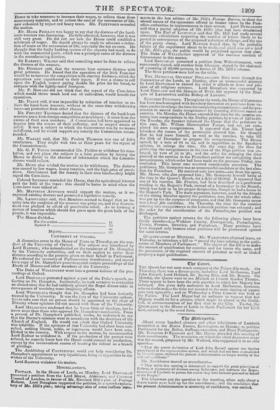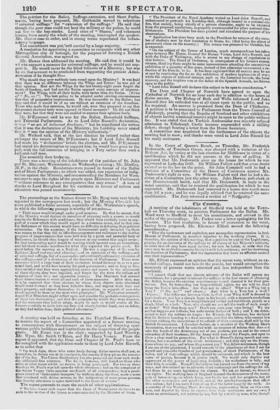Cbt fartropotia.
About seven hundred electors and other inhabitants of Lambeth assembled at the Horns Tavern, Kennington, on Monday, to petition Parliament for the Ballot, Suffrage-extension, and Short Parliaments. Mr. Tennyson D'Eyncourt and Mr. Hawes attended this meeting of their constituents. The resolution on which the chief discussion arose was the second, proposed by Mr. Welford, who supported it in an able speech— ‘4 That the recent declaration of Lord John Russell against any further amendment in the representative system, and which had not been contradicted by his eldleagues, rendered the present Administration no longer worthy of the national confidence."
Northhouse moved an amendment-
" That while this meeting is determined to support the great principles of Reform, it deprecates all division among Reformats, and instructs the Repre- sentatives of Lambeth to pursue the course they have hitherto pursued on behalf of the People."
The Chairman put the question to the meeting, when only about a dozen hands were held up for the amendment ; and the resolution that the present Administration is unworthy of confidence, was carried.
The petition for the Ballot, Suffrage-extension, and Short Parlia- ments, having been proposed, Mr. Goldsmith moved to substitute " universal suffrage" for "extension of the suffrage." He said that though the poor man could not beat the military or the police, he could sat fire to the bay-stacks. Loud cries of " Shame," and vehement hissing from nearly the whole of the meeting, interrupted the speaker. Mr. Hawes rose to order, and in strong terms reprobated the inflam- matory language.
The amendment was put:artd carried by a large majority."'—
A resolution for appointing a committee to cooperate with any other Metropolitan city or borough, for the purpose of forming a British General Association, was agreed to.
Mr. Hawes then addressed the meeting. He said that it would be v i n to support a measure for universal suffrage, and he would not sup- port it. He would never be the blind follower of a Ministry; but was he on that account to be precluded from supporting the present Admi- nistration if he thought fit— Why should they now suddenly turn round upon the Ministry? It was !said that there was no difference between the Whigs and Tories: he was not of that opinion. Had not the Whigs for the last twenty-eight years fought the battle of freedom, and had not the Tories opposed every measure of improve- ment ? The Whigs, with all their faults, were better than the Tories. (Cries of " No, no !") The best policy to be adopted under existing circumstances was that of progressive improvement. He was favourable to the Ballot ; but they said that it would be of no use without an extension of the franchise. Those who made that assertion, he would ask, were they prepared to say that the present electoral body were opposed to liberal measures? Ile did not think they were, but that they were not enabled to express their opinions freely.
Mr. D'Eyncourt said he was for the Ballot, Household Suffrage, and Triennial Parliaments. As to Lord John Russell's declaration, it was " an act of indiscreet ,franhness ; " but he repudiated the notion that it was the declaration of the Ministry; his Lordship never stated that it " was the opinion of the Ministry collectively."
Mr. Welford said, that at the last election he retired rather than en longer the return of Mr. D'Eyncourt; but if Lord John Russell had made his " declaration" before the election, and Mr. D'Eyncourt had stated his determination to support him, he would have gone to the
holl, with the full intention of bringing in a Tory rather than such a alf-and-half man. The assembly then broke up.
There was a meeting of the inhabitants of the parishes of St. John and St. Margaret, Westminster, on Wednesday evening ; Mr. Hindley, M.P., in the chair. Resolutions were passed in favour of the Ballot and of Short Parliaments ; to which was added, one expressive of indig- nation against the Ministry, and recommending the Members for West- minster to urge the rights of the people upon Ministers and Parliament " without reference to any consequences that may ensue." A vote of thanks to Lord Brougham for his exertions in favour of reform and education was passed unanimously.



























 Previous page
Previous page